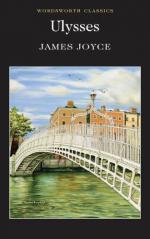Lapwing.
Where is your brother? Apothecaries’ hall. My whetstone. Him, then Cranly, Mulligan: now these. Speech, speech. But act. Act speech. They mock to try you. Act. Be acted on.
Lapwing.
I am tired of my voice, the voice of Esau. My kingdom for a drink.
On.
—You will say those names were already in the chronicles from which he took the stuff of his plays. Why did he take them rather than others? Richard, a whoreson crookback, misbegotten, makes love to a widowed Ann (what’s in a name?), woos and wins her, a whoreson merry widow. Richard the conqueror, third brother, came after William the conquered. The other four acts of that play hang limply from that first. Of all his kings Richard is the only king unshielded by Shakespeare’s reverence, the angel of the world. Why is the underplot of king Lear in which Edmund figures lifted out of Sidney’s Arcadia and spatchcocked on to a Celtic legend older than history?
—That was Will’s way, John Eglinton defended. We should not now combine a Norse saga with an excerpt from a novel by George Meredith. QUE VOULEZ-VOUS? Moore would say. He puts Bohemia on the seacoast and makes Ulysses quote Aristotle.
—Why? Stephen answered himself. Because the theme of the false or the usurping or the adulterous brother or all three in one is to Shakespeare, what the poor are not, always with him. The note of banishment, banishment from the heart, banishment from home, sounds uninterruptedly from the two gentlemen of Verona onward till Prospero breaks his staff, buries it certain fathoms in the earth and drowns his book. It doubles itself in the middle of his life, reflects itself in another, repeats itself, protasis, epitasis, catastasis, catastrophe. It repeats itself again when he is near the grave, when his married daughter Susan, chip of the old block, is accused of adultery. But it was the original sin that darkened his understanding, weakened his will and left in him a strong inclination to evil. The words are those of my lords bishops of Maynooth. An original sin and, like original sin, committed by another in whose sin he too has sinned. It is between the lines of his last written words, it is petrified on his tombstone under which her four bones are not to be laid. Age has not withered it. Beauty and peace have not done it away. It is in infinite variety everywhere in the world he has created, in much ado about nothing, twice in as you like it, in the tempest, in hamlet, in measure for measure—and in all the other plays which I have not read.
He laughed to free his mind from his mind’s bondage.
Judge Eglinton summed up.
—The truth is midway, he affirmed. He is the ghost and the prince. He is all in all.




